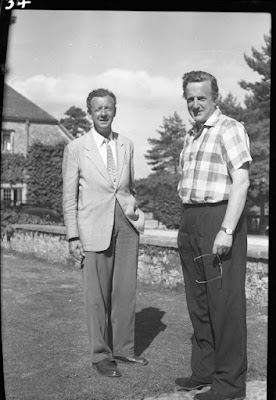I had many of my most important formative musical experiences at the Dartington International Summer School as a teenager and have never ceased to marvel at the thrill of its melting pot, its gorgeous surroundings, the virtually "sacred space" atmosphere inside the Great Hall and more. Its history is as astonishing as its music. Imagine my joy, then, on discovering that Unbound has taken on a new pictorial history of the summer school by the music journalist Harriet Cunningham. I've jumped in to contribute to its funding - I'll take the full-whack hardback, please! - and hope that all my fellow Dartington fans will consider doing so too. You can find it here. All photos (c) the Dartington International Summer School.
Meanwhile, I asked Harriet what set her off on this wonderful project.
HC: My experience of Dartington Summer School goes back way, way before I was even born. My parents met at Dartington sometime in the late '50s/early '60s. She was a student, he was a trog [Dartington's student-assistants]. So by the time I first came to Dartington, aged 4 months, in 1967, it was already in my blood. We continued to make the trip down the A303 then the M4 (once it was built) every summer. I am told that at the age of 4 I listened, transfixed, to the Amadeus Quartet playing Haydn and then demanded to learn the violin. It’s a nice story. I can’t remember it at all! My first memories of the Summer School are of wasps on danish pastries, rides on the Donkey and swimming in Aller Park pool.
I do, however, remember sounds and artists and concerts. Like the sound of the choir warming up in the Great Hall every morning; like Jacqueline du Pré, beautiful and difficult, teaching cello; like being scared witless hearing ‘The Soldiers Tale’, and listening to the two pianists rattling out the orchestral accompaniment for the Schubert Mass. As I grew older I participated more - I sang in the choir, I worked in the kitchens, I trogged and, eventually, played in the orchestra for the conductor’s class, under the lovely Diego Masson.
What makes Dartington special? I’ve thought about this a great deal. Of course, there’s the beauty of the surroundings, which everyone remembers, even if we gloss over the rain and grey skies in our memories. But I think it’s also to do with the mix of people, and with mixing people. There’s something about shoving a diverse bunch of musicians into a space and saying ‘play’ that can act as a catalyst for some amazing creative leaps. Or not. But there’s always the chance!
 |
| Benjamin Britten & Peter Pears at Dartingon, 1958 |
Why did you want to write a book about it?
 |
| Janet Baker & Viola Tunnard, 1965 |
What aspects of its history have "jumped out at you” most strongly?
1950s Britain is fast becoming something of an obsession for me. Post-war Britain underwent a social, economic and intellectual revolution, and the Summer School, and Glock’s approach to music and education were very much part of that revolution. I’m also fascinated by the characters — Glock, of course, and people like Imogen Holst, Nadia Boulanger, Hans Keller and George Malcolm, so many others — who make up the story.
Which images have you most enjoyed discovering in the archives?
Silly, random things have caught my eye in the photos. The 1950s fashions — hats, gloves and, for men, jackets and ties at all times, except if you are violist Cecil Aronowitz, in which case you only wear shorts. The smoking - pipes and cigarettes. The posing, and the lack of posing. People often seem uniquely relaxed and expressive in the photos - as if being immersed in music and musicians allows you to be who you want to be. Perhaps that’s part of Summer School magic.
I also enjoyed finding pictures with personal connections, although I don’t think I’ll ever forgive my mother for allowing me out dressed like that.
 |
| A very young Harriet in a violin masterclass with Roger Rafael |

